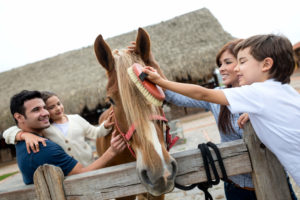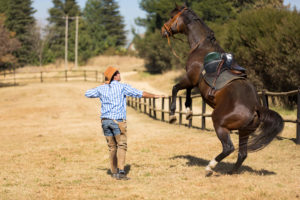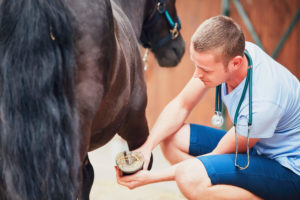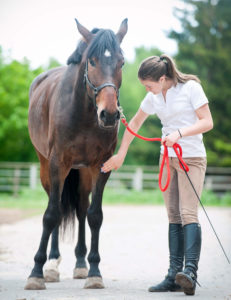
As caregivers, we often take the lead when it comes to ensuring our horses are happy and healthy, but by holding the reins,are we adjustingthem to our wants and needs, or are we adjusting totheirs?
To enhance equine welfare, changing our actions and habits is a necessary first step, although not an easy one. Debbie Busby, a researcher representing Human Behavior Change for Animals (HBCA), says human behavior is the root cause of most horse wellness issues.
“To make a sustainable difference to horse welfare,” she says, “owners must apply the findings of research into human behavior change.”
Busby and her team concluded that the top challenges horses face with their owners include:
1. Unresolved stress
Although our horses can’t verbalize issues related to stress, physical signs of equine stress include digestive issues and outbursts of aggression. Also, don’t forget to check the ears; ifthey are flicking back and forth or are swiveling at a fast pace, your horse is showing he or she is more alert and in a heightened state of anxiety. The horse might be trying to locate the source of the frightening sound, but chances are they are overwhelmed overall. A tight, pursed or pinched mouth is another subtle sign that speaks volumes. Tension, especially around a horse’s mouth, means they are worried or scared.
What can we do? Responding to these symptoms with action is extremely necessary.Educating yourself and other horse caregivers about signs of stress and pain can only help us see what we are not providing for our horses.
Are you visiting them right after work, perhaps when you are preoccupied with the heaviness of your day? We know animals can sense emotion, but did you know they can also read facial expressions? Without a routine, horses can feel anxiety. Your horse’s environment could be stressful to them, especially if they feel a lack of social stimulation. Their level of feeling confined and stir-crazy is measured by them, and must be adjusted by you.Many horse owners have turned to soothing music, natural calming supplements, or aromatherapy, on top of further routine scheduling to help with anxiety.
Fully taking on the role as caregiver means to explore the root of your horse’s discomfort.
2. Unresolved pain
Pushing horses too hard, or not slowly adjusting an out-of-shape horse for the spring season, is something that is unfortunately too common. Try and listen to your horse. If they aren’t performing to your expectation right from the gate, it means you might have to adjust your routine, as well as your schedule, to ensure your horse’s health and happiness.
3. Inappropriate nutrition
Overfeeding and obesity (as well as underfeeding) affect an extremely large numbers of horses, often for a long time with varying severity of suffering. We should not assume that the one-size-fits-all approach necessarily works bestfor our horses, even if it has been working just fine. Consider supplementation, as well as changing up different amounts of feed and treats incrementally to see how your horse responds.
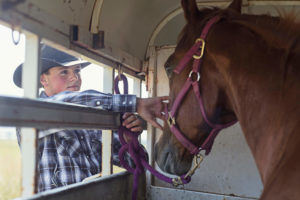 Better owner education (based on solid research) would ensure that the right nutritional choices are made for individual horses, to not only enhance their physical wellness, but their emotional and mental wellness too.
Better owner education (based on solid research) would ensure that the right nutritional choices are made for individual horses, to not only enhance their physical wellness, but their emotional and mental wellness too.
4. Inappropriate stabling and turnout
Horse welfare is risked when the amount of time spent at pasture or spent stabled does not meet your horse’s individual needs. If horses are kept in social isolation for longer than they would like, or are exposed to unsuitable grazing conditions, they might become depressed, more likely to act out, or more at risk of developing intestinal or musculoskeletal problems.
Welfare problems associated with incorrect stabling can affect horses for a long time. Investing time to observe your horse’s behaviors in response to the conditions you provide for them, are important to see what makes your horse at their happiest.
5. Unaddressed suffering
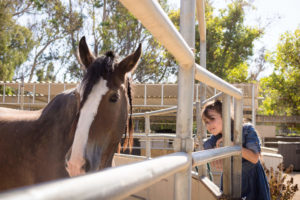
As caretakers, especially for sick or aging horses. we must ensure they are not suffering, and their needs are being addressed.However, when your horse fully enjoys every day, as they do when they get to spend time with you, they live longer.Equus magazine explains the five essentials for horse longevity, including: caring for their teeth, watching their weight, keeping them active, and adjusting their diet as their needs evolve.
While owners of all horses– especially aged horses– are increasingly concerned about their health and quality of life, surveys show that owners are not always showing this in practice. Data points to declining management as horses age, particularly for the retired horse, as well as insufficient or appropriate preventive healthcare.
Thetherapeutic benefits and calming effect horses have on us is no secret, but why can’t we be make sure we are doing that for them?Allowing your horse to discover new things they like and dislike, is important (and exciting!) for you both.
The main responsibility of a horse owner should always be to ensure our four-legged family member is at their happiest and healthiest. We owe it to them to let us carry that allegiance on our backs, for a change.
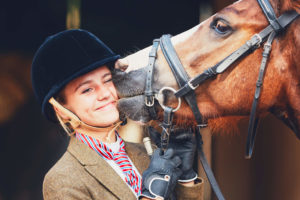
–

